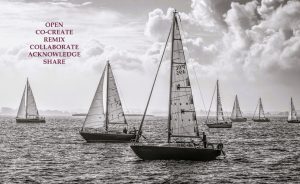OPENNESS and SUPPORT
The second lap of our ONL journey has got us thinking more about what it means to be open, and whether we can really keep our private and professional lives separate. In my fantastic PBL group Take V, I think we have managed to establish an atmosphere of trust so that we can freely share our thoughts on all aspects of the topic. It is even more challenging and far more inspiring that we come from diverse backgrounds in terms of our geographical and academic contexts, as well as having different life experiences. If we want to enjoy the process and our ONL experience, we need to be open to new people, views, challenges.
Being open and sharing requires trust, and also the acknowledgement of other people who inspired us create new content. Open education calls for sharing resources in an ethical and democratic way, so that we carefully choose the material that we want to adapt or use, respect the copyright licences, always mention the authors and enable others to share the material further under the same or similar conditions that we used.
In order to be able to share our resources and to access open resources, we still need the support and guidance of our colleagues and institutions. This is why I found the webinars for this topic really useful even though they served quite a different purpose. Maha Bali (http://doi.org/10.5334/jime.565) really encourage us to think about ourselves as people of the world and how we can all contribute to a more open, democratic and generous surroundings, both in our professional and private lives. The talk and the tasks were really inspiring, and it provided inspirational quotes and gave solid foundations for exploring the topic further. On the other hand, Jorg Pareigis (https://www.kau.se/en/researchers/jorg-pareigis) gave a fantastic workshop on creative commons licensing and presented great open educational resources we could use to create our own content. It actually inspired me so after the workshop I created materials for my students for that week. For me, his workshop was a great experience because we do not get this sort of institutional support, i.e. until now through participating in ONL via EUGLOH project.
CHALLENGES OF CREATING OPEN EDUCATION RESOURCES

The open education resources (OER ) are like a huge ocean you need to navigate, but you can’t do it on your own. You need to be open to contact and consult others, collaborate with your boat crew, but also communicate with other boats so that you don’t crash into each other, or prevent some of your crew members falling off the boat.
Namely, both using and creating OER brings a lot of challenges. Some of them can come from the availability of technology around the world, different copyright issues and ways of quality assurance. The other factors are more personal, i.e. individuals might be hesitant when it comes to changing their ways of delivering courses. Or they might not receive enough institutional support to implement the open course.
What can help is for the institutions to organise professional development, set clear guidelines, show best practices, foster community collaboration and get accessible technology. Easily said than done, right?
Although OER fosters accessibility to education and social justice, it is still not free of charge to establish it and it is available to a larger extent in well-developed countries. The institutions need to ensure that they have the necessary technology infrastructure, as well as support system for educators and learners, which all requires additional funding. However, if we take it step by step, we will get there eventually.
Resources:
https://telrp.springeropen.com/articles/10.1186/s41039-022-00185-z
Petrides, L. Jimes, C., Middleton-Detzner, C., Walling, J. Weiss, S. (2011). Open Textbook Adoption and Use: Implications for Teachers and Learners. Open Learning, v26 n1 p39-49